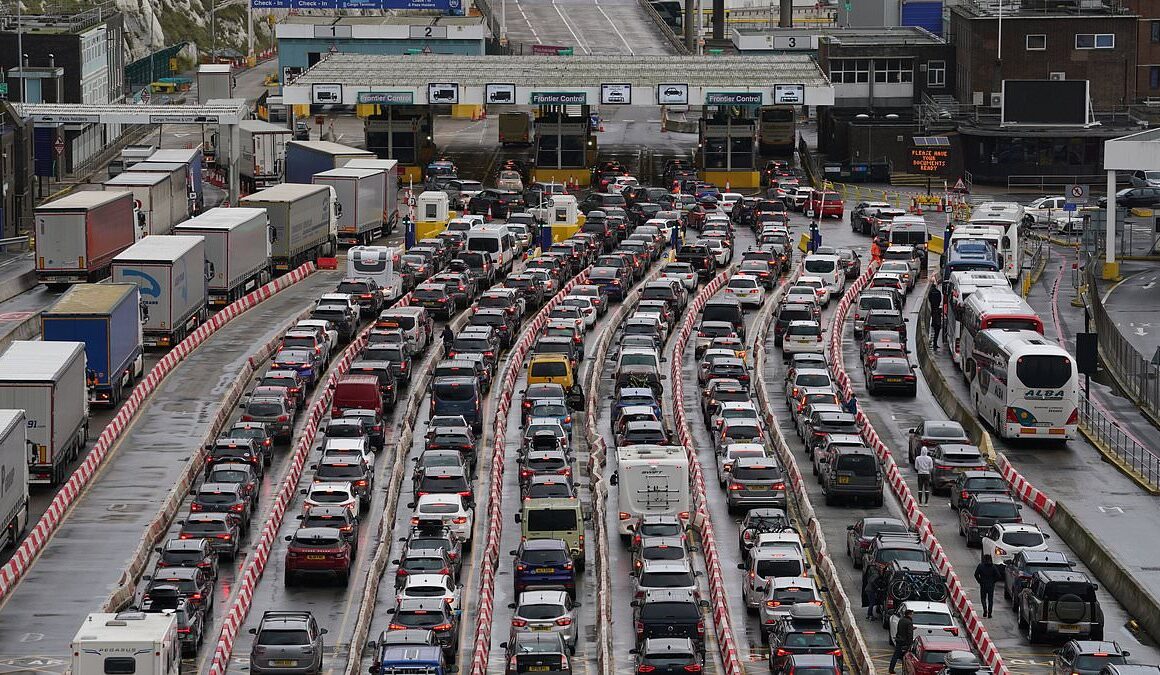Labour will expand the French border control zone at Dover in a bid to avoid chaos when EU fingerprinting comes in.
The Home Office will today announce the streamlining of EU border checks to reduce the risk of queues and mitigate travel chaos at peak times in Kent when the new EU Entry/Exit System (EES) comes into force in the Autumn.
The new system will require holidaymakers to undergo biometric checks, meaning there could be huge tailbacks at ports such as Dover, the Channel Tunnel and Eurostar terminal if infrastructure fails to cope with the requirements.
Today ministers will lay down a Statutory Instrument in Parliament to enable French border officials to operate within an expanded border control zone at the Dover and ensure there is more space to process passengers.
Immigration Minister Seema Malhotra said: ‘The EU’s Entry/Exit System has been in the pipeline for several years.

The new ‘entry-exit’ system (EES) will require holidaymakers to undergo biometric checks, meaning there could be huge tailbacks at ports such as Dover (pictured)

Immigration Minister Seema Malhotra accused the previous Government of ‘sitting on its hands’ regarding the impact of the new EES coming in the autumn
‘But instead of pulling out all the stops to ensure travellers and businesses coming into and out of Britain will be unaffected, the previous Government seems to have sat on its hands and let others get on with the hard work needed.
‘We have been reviewing the preparations that have been made so far and, although the Port of Dover, local authorities and business have done much excellent work, previous Home Office Ministers have simply not done enough to mitigate the impact.
‘We are now working swiftly to minimise the risk of excessive queue times as much as possible.
‘However, we have lost valuable time under the previous Government.
‘EES checks will be a major change to the EU border so the public should prepare for some queues during peak times when they are first introduced.’
The EES scheme, which is set to go live on October 6, has already been delayed twice after they initially intended to impose the stringent checks from 2022.
Ministers have insisted work is underway to ensure ports have the right technology despite previous warnings that no such mechanisms currently exist which can scan the face, passport and fingerprints of each passenger while remaining in their vehicle.
As it stands, tourists from non-EU countries like Britain who drive through ports to the Continent and don’t need visas can simply have their passports assessed and stamped by border guards, keeping traffic flowing smoothly.

The new system will require Britons to give their fingerprints and have their photo taken as a condition of entry
But the new system will require Britons to give their fingerprints and have their photo taken as a condition of entry.
Industry sources are still doubtful that it will be rolled out from October, however.
This is because every airport and port in Europe will need to be ready to make the system go live and there are understood to be snags during testing in some countries, with the new infrastructure required not yet installed everywhere.
They said they thought it was unlikely that the European Commission would green-light the system until everyone was ready.
Dover will have 24 kiosks for coach passengers to complete EES checks and will register passengers in cars using agents and tablets, while the EuroStar will have around 50.
Eurotunnel, meanwhile, will have over 100 kiosks and the Home Office estimates checks will add just over five minutes to journey times.







